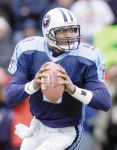by Fred Lief
Associated Press Writer
Sports in 2009 looked down the barrel of a gun.
From Tennessee to Georgia to Nicaragua, gunfire crackled in July. The causes differed—a romance gone wrong, a robbery botched, a self-inflicted wound—but the outcome did not. A gun was the weapon of choice, and all were dead: a former star quarterback and two ex-boxing champions.
Steve McNair was dozing on his sofa in his Nashville condo one weekend when his 20-year-old girlfriend shot him four times. McNair was married with four sons. Police say the woman, Sahel Kazemi, was “spinning out of control” and suspected McNair was seeing someone else. The carnage did not end there. Kazemi turned the semiautomatic pistol on herself.
McNair was 36 and had left the NFL a year earlier. He spent 13 seasons in the league and was the heart of the Tennessee Titans. His closing drive in the 23-16 loss to St. Louis in the 2000 Super Bowl was one of the most riveting finishes in the history of the title game. He was a Pro Bowl player four times. He shared the MVP award in 2003. McNair was fierce on the field and generous off it.
“I’m going to miss you, No. 9,” Titans coach Jeff Fisher said.
Vernon Forrest grew up in Georgia and fought in the 1992 Olympics with Oscar De La Hoya. He became a three-time champion and was the first to beat Shane Mosley. His manager said he was at a gas station when approached for money. Atlanta police said the 38-year-old boxer exchanged gunfire with two robbery suspects and was shot several times in the back. In a sport where bravado rules, Forrest had been known for his modesty and keeping the volume low.
“I viewed Vernon as a great competitor in the ring and an even greater man outside the ring,” De La Hoya said.
Weeks earlier, Alexis Arguello was found dead at his home in Managua, the city where he was elected mayor a year earlier. Investigators said a single gunshot wound to the chest pointed to suicide. Arguello was dead at 57 after a career in which he galvanized boxing fans. He won titles in three divisions. His two bouts with Aaron Pryor in the early 1980s were pulsating, brawling tests of will.
“Those were great fights we had,” Pryor said. “This was a great champion.”
Boxing is brutal every year, but especially so this time. In July, former champion Arturo Gatti died at 37 at a Brazilian resort. Police initially suspected his wife but later determined Gatti hanged himself. Months later, in a grisly parallel, Darren Sutherland, who won a boxing bronze medal for Ireland at the Beijing Olympics, was found hanged at his home.
The sport also lost Ingemar Johansson at 76. The Swede jolted boxing by knocking out Floyd Patterson to win the heavyweight title in 1959. Greg Page, another heavyweight champ, died at 50 of complications from a brain injury during a 2001 fight. Jose Torres, the inspirational light heavyweight champ from Puerto Rico who became a writer, died at 72.
Chicago Bulls fans had a rough day on Feb. 26. They learned of the deaths of former coach and broadcaster Johnny Kerr at 76 and Norm Van Lier, 61, one of NBA’s best defensive players in the 1970s.
Randy Smith, a blindingly fast guard, died at 60. Marvin Webster, the shot-blocking “Human Eraser,” was gone at 56. College basketball coach Kay Yow’s gallant fight with cancer was over at 66. The NBA said goodbye to two owners: Bill Davidson of the Pistons and Abe Pollin of the Wizards, whose name he changed from the Bullets because of the ties to violence.
Wayman Tisdale, the former Oklahoma All-American who spent a dozen years in the NBA before shifting rhythms and becoming a jazz musician, died at 44.
“He was the nicest man in the world with the biggest heart and an even bigger smile,” former Pacers teammate Reggie Miller said.
In football, Jasper Howard and Chris Henry didn’t see old age. Howard, a 20-year-old cornerback for Connecticut, was stabbed during a fight outside a school dance. Henry, the Cincinnati Bengals receiver, died at 26 near the year’s end, falling from a pickup truck during what police said was a dispute with his fiancee.
